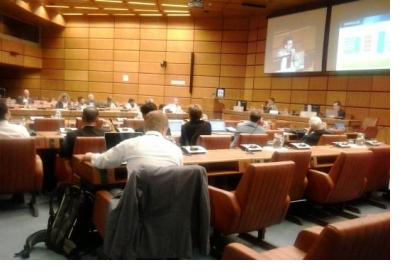In December 2006, the General Assembly of the United Nations established UN-SPIDER through its resolution 61/110 as a programme within the United Nations Office for Outer Space Affairs (UNOOSA) to provide universal access to all countries and all relevant international and regional organizations to all types of space-based information and services relevant to disaster risk management to support the full disaster management cycle.
As a way to take stock of the efforts conducted in these first ten years, to celebrate important achievements, and to outline strategies for the coming decade; the programme conducted its UN-SPIDER + 10 Conference from 7 to 8 June 2016 at the Vienna International Centre. The Conference was used to review efforts conducted during the last decade in four key areas: technical advisory support and institutional strengthening, knowledge management, awareness raising and outreach, and capacity building. In addition, it experts taking part in the conference reviewed key recommendations stemming from technical advisory missions and other efforts conducted by the programme as a way to outline the way forward. The Conference was conducted as a way to coincide with the opening of the 59th session of the Committee on the Peaceful Uses of Outer Space (COPUOS).
During her opening remarks, Mrs. Simonetta Di Pippo, Director of UNOOSA, made reference to the on-going efforts of UN-SPIDER and how the programme is conducting this conference with the aim of gathering suggestions regarding how the programme should steer its efforts in the next fifteen years as a way to contribute to the 2030 development agenda that is framed by the Sustainable Development Goals, the Sendai framework for Disaster Risk Reduction 2015-2030, and the Paris Climate Change Agreements. Mrs. Di Pippo also took the opportunity to comment that UN-SPIDER is also engaged in the UNISPACE+50 process that UNOOSA is conducting on behalf of the Committee on the Peaceful Uses of Outer Space. The statement of Mrs. Di Pippo can be found in the following link: http://www.unoosa.org/oosa/en/aboutus/director/director-statements/2016/director-statement-un-spider-plus-10.html
The UN-SPIDER+10 Conference will contribute to the UNISPACE+50 process that the Committee is conducting with the support of UNOOSA. The Conference will provide elements for UN-SPIDER to outline its efforts in the context of the thematic priorities defined by COPUOS as part of the UNISPACE+50 process, including resilience, capacity buidling and space for sustainable development.
| Attachment | Size |
|---|---|
| ARES_61_110E.pdf | 120.13 KB |

